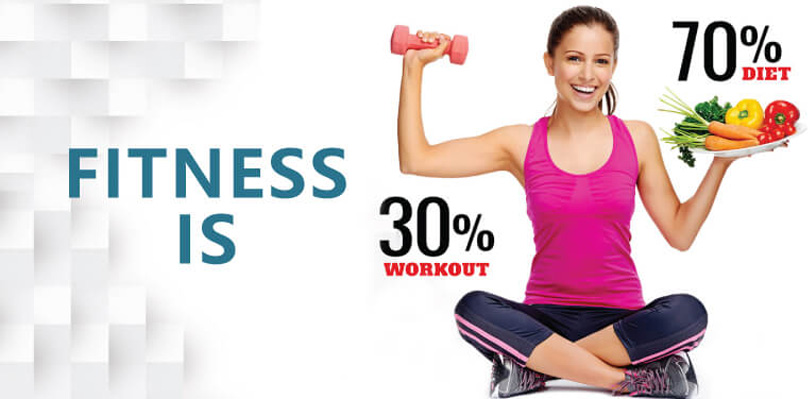Fitness freaks always concentrate on workouts and training to achieve their fitness goals, however, nutrition is equally important in reaching those goals. Proper nutrition provides your body with the essential nutrients to support your physical activity, helps in recovery, and boosts overall health. This article is all about the basic principles of nutrition for fitness enthusiasts. We will cover the importance of macronutrients, micronutrients, hydration, pre-workout and post-workout nutrition, supplements, meal planning, and common nutrition myths. We aim to provide you with the knowledge and tips to optimize your nutrition and achieve your fitness goals.
Importance Of Macronutrients For Fitness Enthusiasts

Macronutrients are essential nutrients that your body requires in large amounts to provide energy and boosts various physiological functions. The three primary and important macronutrients include carbohydrates, proteins, and fats.
Carbohydrates
The primary source of energy for the body is carbohydrates. These are very essential macronutrients, particularly during high-intensity workouts. You can get carbohydrates from including bread, pasta, rice, fruits, and vegetables. According to experts, daily consumption of carbohydrates depends on your fitness goals. However, generally, it is recommended to intake 45-65% of daily calories from carbohydrates.
Proteins
Proteins are important for building and repairing your muscles and other tissues in your body. You can get proteins from foods like meat, fish, poultry, beans, and nuts. The recommended daily consumption of proteins varies based on your fitness goals, but it is generally recommended to take 0.8-1.2 grams of protein per kilogram of body weight.
Fats
Fats are also a great source of energy and play a key role in hormone regulation and cell function. These can be found in foods like nuts, seeds, avocados, fatty fish, and oils. The recommended daily intake for fats is generally around 20-35% of daily calories.
It’s important to remember that the suggested daily intake of macronutrients can vary relying on individual fitness goals, body composition, and activity levels. It’s always the best idea to consult with a healthcare professional or registered dietitian to choose the appropriate macronutrient intake for your exact needs.
Importance Of Micronutrients For Fitness Enthusiasts
Micronutrients are vital nutrients needed by your body in small quantities to support various physiological functions. these nutrients support activities such as enzyme function, immune system function, and bone health.
The two primary types of micronutrients essential to support your daily activities include:
Vitamins
Vitamins are organic micronutrients that are required by your body to function appropriately. There are 13 crucial vitamins, such as vitamins A, C, D, E, and K. Each vitamin has a distinct role in your body, like supporting immune function, boosting healthy skin, and aiding in the absorption of calcium. Vitamins can be found in different foods, including fruits, vegetables, dairy products, and meat.
Minerals
Minerals are inorganic compounds that your body requires for various functions, like bone health, nerve function, and fluid balance. There are two major categories of minerals: macrominerals and trace minerals. Macrominerals, such as calcium, potassium, and magnesium, are required in larger amounts, while trace minerals, such as iron, zinc, and selenium, are required in smaller amounts. Minerals can be found in a variety of foods, including dairy products, leafy greens, meat, and nuts.
Intake Recommendation
The recommended daily intake of micronutrients differs based on individual fitness goals and needs. The suggested daily intake for each micronutrient can be found on the Dietary Reference Intake (DRI) charts provided by the National Institutes of Health (NIH). It’s important to consume different foods that contain a variety of vitamins and minerals to assure that you’re getting your daily needs.
Likewise, it’s suggested to consult with a healthcare professional or registered dietitian to pick the suitable micronutrient intake for your specific needs.
Hydration For Fitness
Hydration is important not only for fitness enthusiasts but for everyone. Water makes up an important portion of the body. Thus, proper hydration is crucial for optimal performance and recovery. During exercise, your body loses water in the form of sweat, but if you don’t replace that water, you can get dehydrated.
Importance Of Hydration For Fitness Enthusiasts
As mentioned earlier, proper hydration is critical for optimal performance and recovery during a workout. It aids in regulating body temperature, lubricates joints, and transports nutrients throughout the body. Dehydration can lead to decreased performance, muscle cramps, and fatigue. Thus, it’s important to keep proper hydration levels before, during, and after exercise.
Proper hydration is also necessary for transporting nutrients throughout the body and removing waste products. It can help regulate body temperature, lubricate joints, and protect sensitive tissues.
Related: Ultimate Effects Of Drinking Water On the Body: Water Facts
Recommended Daily Water Intake
The recommended daily water intake for an average person is around eight cups (64 ounces) each day. But, for fitness enthusiasts, the suggested daily water intake can vary based on their activity level, body composition, and environment. It’s important to stay hydrated throughout the day, not just during exercise. A general rule of thumb is to drink half your body weight in ounces of water per day.
Tips For Staying Hydrated During Exercise
- Drink water before, during, and after a workout: Drinking water before, during, and after a workout can help you maintain proper hydration levels.
- Take fluids with electrolytes: Before engaging in long or intense physical activity, consume fluids with electrolytes as it can help fill lost fluids and electrolytes.
- Monitor urine color: Urine color can be a suitable indicator of hydration levels. A light yellow color shows proper hydration, while a dark yellow color indicates dehydration.
- Avoid or limit alcohol and caffeine: Alcohol and caffeine can have a diuretic effect, which can cause dehydration. It’s best to avoid or limit these drinks before and during a workout.
- Plan hydration breaks: If your fitness routine is long, you should plan for hydration breaks to make sure that you’re taking enough water.
With the help of these tips, you can stay properly hydrated and optimize your performance during your workout routine.
Supplements
Supplements are products containing one or more ingredients, like vitamins, minerals, amino acids, or herbs, that are planned to supplement your diet. While supplements are not a replacement for a well-balanced diet, they can help fill nutritional gaps or enhance athletic performance.
Common Supplements For Fitness Enthusiasts
- Protein powder: Protein powder is a common supplement commonly used by fitness enthusiasts to help meet their daily protein needs. Protein powder can come from different sources such as whey, casein, or plant-based proteins.
Recommended Dosage: The recommended dosage for protein powder varies based on your body’s needs and goals. Typically, it’s suggested to intake 0.8-1 gram of protein per pound of body weight per day. Protein powder can be consumed at any time of the day, but it’s usually consumed before or after exercise.
- Creatine: Creatine is a naturally occurring essence found in muscle cells that can help improve athletic performance, increase muscle mass, and improve recovery time.
Recommended Dosage: The recommended dosage for creatine is 3-5 grams per day. It’s typically consumed before or after exercise.
- Pre-workout supplements: Pre-workout supplements contain a variety of ingredients, such as caffeine, beta-alanine, and nitric oxide, that can help you boost athletic performance and overcome fatigue during exercise.
Recommended Dosage: The recommended dosage for pre-workout supplements depends on the specific product. It’s necessary to follow the manufacturer’s instructions for dosage and timing.
- Omega-3 fatty acids: Omega-3 fatty acids are important fatty acids that are essential for brain and heart health. They can also help reduce inflammation and improve recovery time.
Recommended Dosage: The recommended dosage for omega-3 fatty acids is 250-500 milligrams per day. It’s generally consumed with meals.
FAQs
Can I skip pre-workout nutrition if I’m trying to lose weight?
No, pre-workout nutrition is essential regardless of your fitness goals. Skipping pre-workout nutrition can lead to decreased energy levels and poor performance during exercise, which can ultimately hinder weight loss progress.
Are supplements necessary for fitness?
No, supplements are not necessary for fitness. A well-balanced diet that includes a variety of whole foods can provide all the nutrients necessary for good health and athletic performance. However, supplements can be beneficial for individuals with nutrient deficiencies or those who require additional support for their athletic performance.
How much water should I drink during exercise?
The amount of water you should drink during exercise varies based on individual needs and the intensity and duration of your workout. As a general guideline, it’s recommended to drink 17-20 ounces of water 2-3 hours before exercise and to drink 7-10 ounces of water every 10-20 minutes during exercise. It’s important to listen to your body and drink water when you feel thirsty to avoid dehydration.

